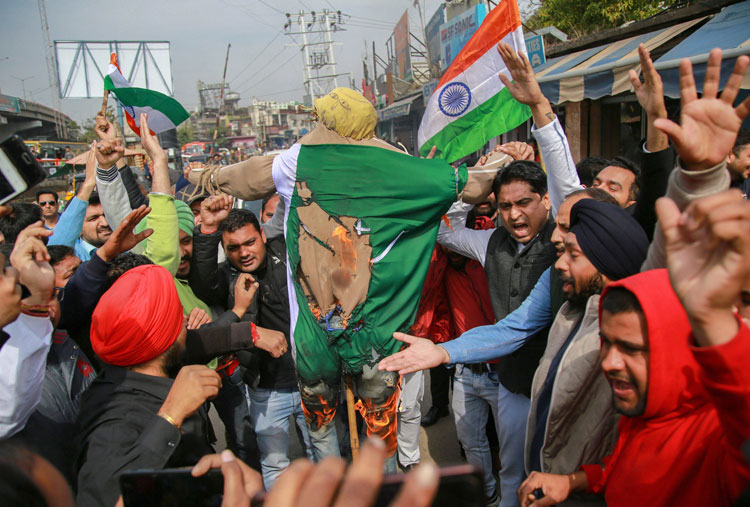Farooq Ahmad Dar is unlikely to be found among those engaged in discussions on the Geneva Conventions.
But the “human shield” — driven around trussed up on an army jeep as a warning to stone-throwers — had one question.
Why had he got no justice even nearly two years after his ordeal in April 2017?
“Why are all these people talking today but were silent then,” Dar, an artisan with no formal education, told The Telegraph on Thursday, a day after India invoked the Geneva Conventions and asked Pakistan to extend all courtesies to captured fighter pilot Abhinandan Varthaman.
On Thursday, the defence establishment refused to describe Pakistan’s offer to release the pilot as a goodwill gesture, saying it was in consonance with the Geneva Conventions.
A few hours earlier, Dar had said: “They (the army) did injustice to me. I was an ordinary voter but they branded me a stone-thrower. He (the army officer accused of ordering Dar to be tied on the vehicle’s bonnet) was encouraged while a common man was driven around (as a human shield).”
The use of human shields is forbidden under the Geneva Conventions, rules formally adopted in 1949 that provided the foundation for international humanitarian laws in the aftermath of World War II.
Major Leetul Gogoi had triggered outrage as well as admiration when Dar was trussed up and tied to the bonnet of his jeep before parading the artisan from Budgam across villages as a warning to potential stone-throwers.
Army chief Bipin Rawat had come out in the major’s defence, saying it was an “innovative” way to fight a “dirty war”, and later awarded Gogoi a commendation card for his role in anti-militancy operations.
Dar has always maintained that he was not a stone-thrower but was among the few who had come out to vote in a parliamentary bypoll in Srinagar on April 9, 2017, a claim that has since been corroborated by a police enquiry.
The elections had clocked a 7 per cent turnout amid pro-azadi protests.
Last year, Major Gogoi was found with a local girl in a Srinagar hotel. An army court of inquiry indicted him for “fraternising” and removed him from his unit.
The artisan from Budgam said he got no justice from the national media too. “They distorted my statements. I would tell them one thing and they would show another,” he said.
Few in the country had stood by Dar after his traumatic experience. Some, in fact, appeared to promote the human shield act.
Tiger Shroff’s Baaghi 2, released last year, showed the lead actor, an army officer, tying a man to his jeep for disrespecting the national flag.
Among the many Kashmiris who on Thursday welcomed Pakistan Prime Minister Imran Khan’s decision to release the captured pilot were former chief minister Omar Abdullah and separatist leader Mirwaiz Umar Farooq.
“Very glad to know that #WingCommanderAbhinandan will be heading home. I’ll wait for him to be back on Indian soil before I welcome him back but I’m greatly relieved that PM @ImranKhanPTI announced the imminent release of our pilot,” Omar tweeted.
The Mirwaiz in a tweet said: “Welcome decision by Pakistan PM @ImranKhanPTI to release the captive Indian pilot as a peace gesture. Hope better sense prevails the war clouds scatter and the #Kashmir dispute moves towards a peaceful resolution.”












